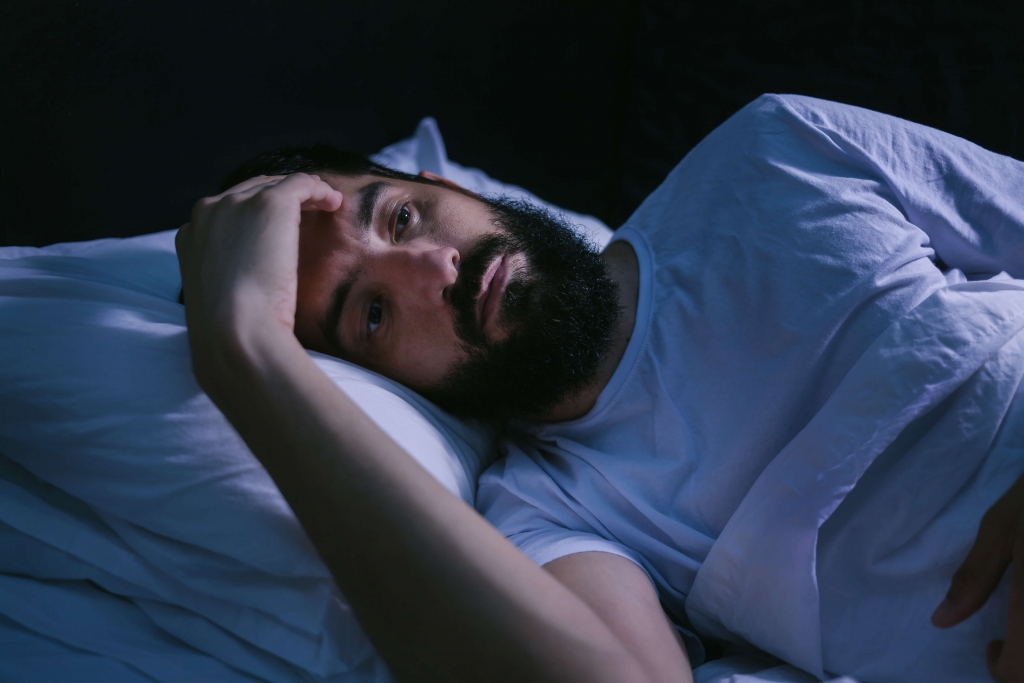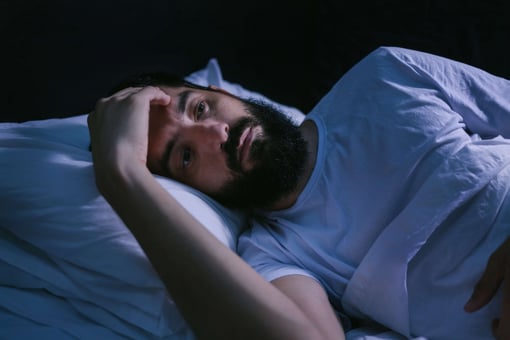5 Ways to Manage Insomnia Caused by Anxiety

With the kind of challenges everyone is facing in the world today, it’s not surprising that many people are suffering with anxiety. And with that anxiety comes a major symptom: insomnia. For many people, anxiety and an overactive mind causes sleepless or restless nights. This lack of sleep can, in turn, create problems with concentration, memory, and learning, consequently impacting work or school performance.
The good news is, there are many ways to manage and mitigate anxiety-related insomnia. Here are some of the most frequent causes of anxiety, and effective ways to overcome it.
Common Causes of Anxiety
Some people are more likely to develop anxiety than others. In many instances, genetic predisposition and upbringing play a role in the onset of the condition, but sometimes stressful circumstances or overstimulation can be triggers. So, before you schedule a session with a qualified mental health practitioner, it’s helpful to determine what’s causing your anxiety.

You might be getting anxious because of some or all of these causes:
- Consuming too much caffeine: If you’re fond of a robust cup of coffee in the evening, you should consider something less caffeinated like chamomile tea. Caffeine is a stimulant, so it can cause your mind to go into overdrive, leading to insomnia.
- Smoking after dinner: Tobacco products, much like coffee, are also stimulants. So, it’s wise to avoid lighting up after you’ve had dinner. If you wish to smoke, try to do it in the morning or during the mid-afternoon.
- Working after dinner: Home-based workers who want to render more overtime may be tempted to dive back into work in the evenings. Although your drive to work is commendable, doing more paid work after you’ve had supper will just stimulate your mind. If you already struggle with insomnia, doing late-night overtime may make it harder to sleep.
- Watching TV before bedtime: Many people put TVs in their bedrooms so they can unwind in comfort. However, TV before bedtime has the same effect as using your phone or computer: the light can trick your body into thinking it’s daytime. If you’re experiencing insomnia, it's best to keep television use to a minimum, and limit yourself to one or two hours in the early evening.
- Problems in the family: Family dramas can leave you stressed and sleepless. It’s unrealistic to think you can get rid of all your family problems right away, so try to tackle them one at a time. Tell yourself that if the problem cannot be solved just like that, then you will look for ways to resolve it in the morning.
If you've checked all of these causes and none of them seem to be major triggers for your anxiety, then you may have a sleeping disorder. Discuss your symptoms with a doctor or psychiatrist if you feel you need professional help or medication. Alternatively, sleep remedies like therapy blankets may help. To find out more, check resources like Cosier’s guide to weighted blankets, to see whether these cost-effective, non-medical solutions can minimise your anxiety.
Keep a Journal
Your doctor or psychiatrist can only diagnose anxiety-induced insomnia if they know about your sleep cycle. So, they may recommend you keep a journal to note your daily activities and sleeping patterns—even if only for a couple of weeks. Sometimes, a person with anxiety develops insomnia, but insomniacs can also develop anxiety. As it can go both ways, it’s important to determine the specifics of your condition.
This journaling exercise typically requires you to jot down your daily activities, what you eat or drink, where you go, who you interact with, and how well you sleep during that timeframe. Your doctor will then be able to pinpoint some of the clear causes of anxiety and insomnia you’re experiencing.
After your doctor makes their recommendations, you should continue the journaling process to help track results. This will help you and your doctor to spot any clear effects of treatments prescribed.
Take a Polysomnogram
If you are seeing a sleep specialist—a doctor who specialises in treating sleep disorders—they may recommend you undergo a polysomnogram or sleep study. In a sleep study, your body’s physical changes during sleep are noted electronically, and physiological aspects such as brain waves, heart rate, breathing and oxygen are monitored. The specialist will then interpret the sleep study results to show what’s happening to your body while you’re unconscious and if necessary, provide you with a diagnosis.
Ask Your Doctor About Cognitive Behavioural Therapy
If your doctor believes you are indeed an insomniac, you may be referred to a mental health practitioner for Cognitive Behavioural Therapy for Insomnia (CBT-I). This treatment aims to address your insomnia with specialised counselling, as an alternative to medication. According to the Mayo Clinic, CBT-I is believed to be just as effective as medication—in some cases, even more so. CBT-I deals with insomnia by helping you identify, comprehend and adjust any behaviours that make it hard for you to fall asleep, or achieve a healthy night’s sleep.
Relax and Avoid Worrying
Sometimes, you can be so worried about not getting enough sleep that your stress prevents you from sleeping at all. Instead of letting your anxiety build, try some relaxation and anxiety alleviation techniques to calm your mind. Some well-known methods include:
-
- Measured breathing: There are many ways to practice measured breathing and muscle relaxation, such as through yoga exercises—either in-person or online—or guided meditation. You can even sit down in a comfortable spot in your home and simply devote some time to breathe deeply, releasing unhelpful thoughts from your mind.
- Devote your bedroom to sleep: When you bring work into your bedroom, your brain forms the association that work-related tasks belong there, which can lead to increased stimulation when you’re trying to sleep. If you live in a small space, such as a condo, try to set aside a nook where you can do your work tasks. At the very least, avoid doing work in bed. That way, the bed and bedroom are devoted only to rest and sleeping.
- Schedule a strict bedtime: If you find yourself being sucked into work after hours, or staying up late watching television, then you may want to set a strict bedtime for yourself. No matter how urgent your work tasks are or how much you’re enjoying a show, once you reach lights out time you should go to bed. You’ll be surprised how much a consistent bedtime can help sleep patterns in the long term.
- Set your alarm for the same time each day: One of the most effective ways to alleviate sleep problems is by waking up at the same time every day. This means that even if you’d prefer to wake up earlier than usual or sleep in, this inconsistency may harm your insomnia rather than help it. Your body needs adequate rest to help you manage work and life. Set an alarm for a consistent wake-up time each day, to teach your body and mind the number of hours it needs to rest.
- Exercise daily: There are a variety of reasons why people don’t get enough exercise, from workload to a lack of motivation. Unfortunately, this absence of physical activity can lead to pent up energy. Fortunately, if you can fit exercise into your daily routine, you may be pleasantly surprised to find that it may help address your anxiety, and in turn, your insomnia. It doesn’t have to be a long or high-intensity workout. Just set a fitness goal that’s realistic, such as a light jog or a walk around the neighbourhood if the weather permits.
- Play soft music or ambient sounds: If you’re an anxious person, try listening to calming music in the background as you work or drift off to sleep. There are plenty of instrumental songs on music streaming services, and curated playlists designed to help you fall asleep. Some people prefer having ambient sounds play to help them relax, like rainforests and beaches. Both options will help soothe your mind and prevent anxiety from turning into insomnia.
- Take warm baths: Taking a bath in the evening is a great way to relax and unwind after a long day—particularly if you light some candles and use a bath bomb or bubbles. It allows your body to relax and embrace stillness, not unlike meditation. A warm shower can have a similar effect, if you don’t have a bathtub at home.
Final Takeaway
If you find it difficult to fall asleep at night due to anxiety, you’re not alone. Millions of other people suffer from the same problem. The good news is that you don’t have to suffer in silence; there are plenty of ways to manage your anxiety and insomnia, from cognitive behavioural therapy to practicing good sleep hygiene. Following these suggested methods will help you take great strides in rest and relaxation. Remember, a good night’s sleep will prepare you for the rigors of the day, so be sure to prioritise it for your own productivity and welfare.



